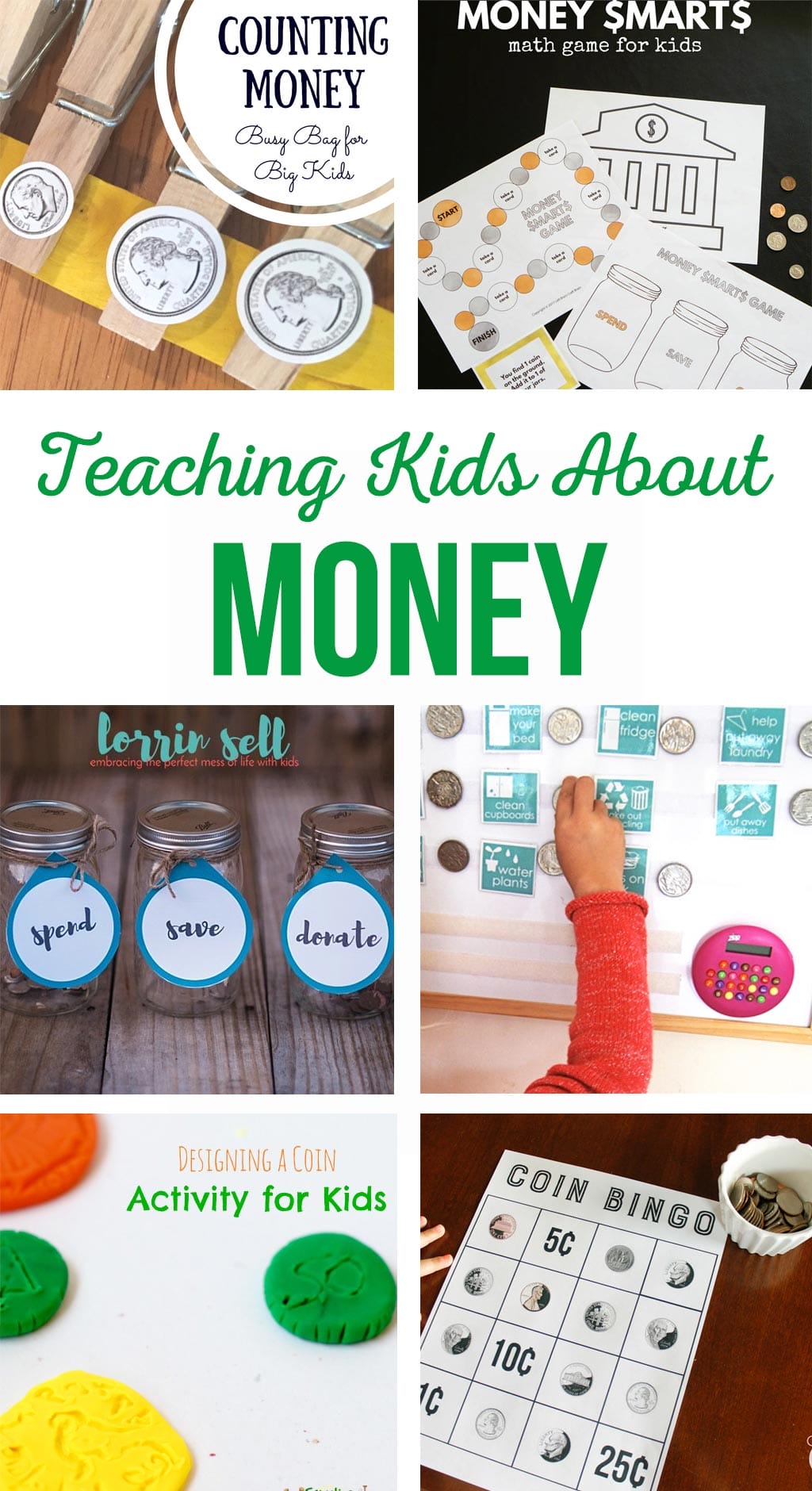Hi everyone! My name is Camille Walker and I blog at MyMommyStyle.com, a family lifestyle blog for the modern mom! We love the girls at The Crafting Chicks and are so excited to be guest posting here again! Summer learning is a big part of our blog and education in general for kids. You can find a summer reading bucket list here, a fun fruit train, or more fun activities here on our blog.
It seems like Summer time can be tricky with kids and teaching them to work. I don’t know about you, but in our house we go through ebbs and flows of working through different job charts and the level of motivation to fulfill the charts! Sometimes I think it is harder on me as the mother than it is for my kids to actually do them. I HATE having to nag. This post is one to help you get through those moments and create new ways to work together as a team. My husband and I have presented together on this topic on a few occasions and this post was actually written mostly from his experience. I will say that I think that it is perfectly okay to mix up your approach. Chances are you as the mother may be the one that is having to enforce the rules and if you are getting sick of a certain approach or you feel like you need to tweak your approach from child to child, then do it! You know your kids best and sometimes it is trial and error.
1) Work is #1
The most important lesson you can teach your child is that money is a direct result of work. Recently I had a conversation with my 1st grader that went something like this:
Jackson: “Dad I want this ______ (I’m sure it was a lego or pokemon card, but insert the blank for your own child).”
Dad: “Sorry Jack, but we don’t have any money for that.”
Jackson (excitedly): “Oh, I know…just use your card. That will work!”
Now, I know many of you have had this exact conversation with your children. Our society has become more and more immune to the “sting” of the association that “this friggin pokemon card just cost me a half day of work”. It has become so easy to spend and is becoming easier and easier.
I recently read an article about the new Apple pay system where they discussed the term payment “friction”. The new system will reduce payment friction by one step in eliminating the need to carry credit cards all together by simply swiping your iPhone at any participating retail store. This is huge for retailers because they know the lower the number of barriers between you and the completed transaction, the better. Pretty soon all we will need to do is look at something on amazon, blink a couple times at the screen and it will be ours.
We need to make a conscious effort to combat this with our children. They need to understand that work = money, not credit card = money.
2) No Allowance
I know this one is somewhat controversial, but in my opinion the best way to train your kids to be entitled is to give them an allowance. Just think about it, if you had the choice between delivering papers at 5:00 am for 2 hours (actual work) and throwing a huge fit for 30 seconds until you get what you want (allowance), which would you choose? We need to seriously think about what lesson we are conveying to our children when we just give them money for nothing.
Traditionally an allowance is thought of as a set stipend given to a child weekly, monthly, etc. But if we are constantly giving money to teenagers, or giving into buying that toy for a crying toddler, etc…isn’t this the same thing as an allowance?
Now, I am going to qualify my stance on this by saying that every situation is different. When I was in high school I played 3 sports and was involved with other extra-curricular activities. My dad did give me money for gas and a few dates (when one said yes…), but he always let me know that he considered sports and extra-curriculars to be my “job”. He held true to this as some of my other siblings were told to “get a DANG job” when they came and asked him for money after a 3 hour session of Playstation. So you really have to evaluate each situation, but use your gut because that will usually tell you whether or not your child is riding the gravy train.
**As a side note, one method I have done that has worked well is using a “pom pom” system with my kids where they can earn pom poms for good behavior and doing extra chores around the house. Once their jar/cup is full I have attached it to being worth $3. I have loved this system because it allows for flexibility and the opportunity to earn money in different ways.
3) Saving
Saving is such an important quality to instill in our children, even at a very young age. Each child is born with different saving tendencies. We’ve got one child who can’t spend his money fast enough, and another who hides her money and we have a hard time getting her to buy anything. Each type needs to learn the importance of saving and spending when appropriate.
When a child reaches an age when they understand saving (usually about 5), it’s a great idea to find some bigger ticket item that they really want (for a 5 year old that can even be a toy worth $5). This is a great time to show them that the way they can get items they want is by saving. Jackson (1st grader) is currently saving for the PC version of Minecraft which is $26.95 – yeah, I don’t get that game either… He has been saving for over a month and is about halfway to his goal. For me, it’s all about teaching the delayed satisfaction. It’s not about the money, it’s about the teaching.
Sometimes your teachings go in a direction you weren’t intending. Recently the mother of Jackson’s best friend in the neighborhood informed me that her son was getting in on the action. She said that her son wanted Jackson to get the game so bad that he was asking her for ways he could earn money to help Jackson reach his goal! I’m still waiting to see how this one turns out, we may have to have a discussion with Jackson on child labor laws…
4) Giving
I am convinced that children are born with such a giving nature. Just as in the example above, kids love to help and give. They are naturally charitable. We as a country are naturally charitable as well. Did you know the US is the most charitable country in the world? Last year we gave $30.46 billion which is more than the next 2 countries combined: UK – $13.66 billion & Germany $13.11 billion. In my opinion, this is why we are the richest country on earth; because we pay it forward.
Whether you give to your church, charity, or someone in need it is so important to teach the principle of giving to our children. At our house we always give 10% to our church. It is great to see the satisfaction in my child when they give their 10%. After all, money is just an instrument – an instrument to satisfy our needs. If our needs are satisfied, why should we hoard all our instruments if others are in need? I promise you will feel great as you watch your child feel joy in giving to others.
5) Don’t Squash Their Ideas
Last year, Jackson had an idea that he was going to sell rocks door-to-door. He loved his rocks, so naturally he thought everyone else would love them too. I told him nobody was going to buy his rocks. He disagreed and an argument ensued. I stopped myself and decided this would be a good teaching moment, so we headed out to sell rocks. As you can imagine, no one bought any of his rocks. They thought he was pretty darn cute, but he came home empty handed.
About a month after the failed rock sales, Jackson came up with another idea. It was Black Friday, all the kids were home from school and parents were getting back from late night shopping. Jackson wanted to sell donuts and hot chocolate in our yard. It was a perfect idea! We literally sold out of 2 dozen donuts within 15 minutes. I rushed back to the store to pick up their last 2 dozen donuts, and we sold out of those shortly as well.
I tell this story because I learned a very important lesson that day – He needed to find out for himself. Sometimes we as parents tend to want to tell our kids how everything should be done. Sometimes the best ideas come after several ideas that failed. When your child comes up with an idea to make money or work, seize the opportunity. They will have so much more satisfaction from an idea they come up with on their own.
Resources
If you have a child who is wanting to earn more money on their own, please check out our e-book out here with 50 ways for child to earn money!
You can also find ideas of how to save money while traveling to Disneyland, make money as a stay at home mom, or easy ways to save money today!
I hope you have found this post helpful and would love if you stopped by and said hi on our blog or on social media! You can find us here: Instagram, Pinterest, Facebook, and Twitter.
Still want more Money Management ideas?



I just love these tips! Great ideas! Thanks for sharing!